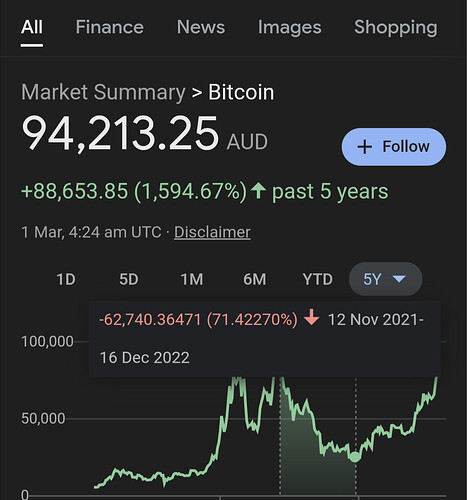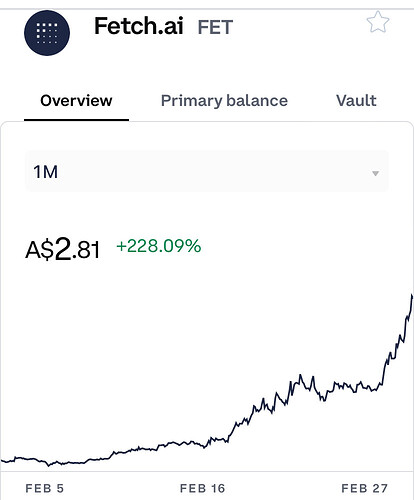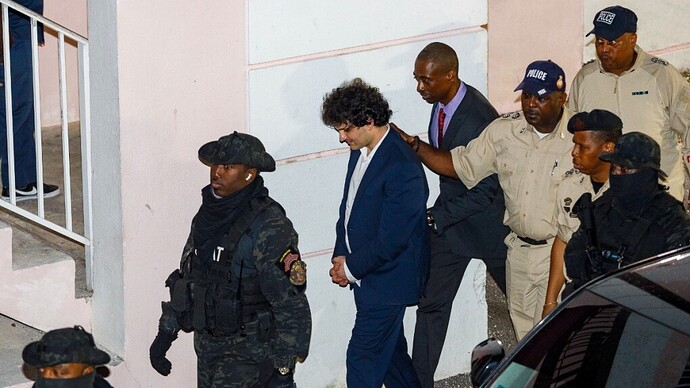How do crooks control your funds?
which crooks the investment bankers?
Crypto like the internet was used by shady people early days, and still now with scammers demanding payment in bitcoin…but it has survived, and the value now is more that it holds its value better than FIAT. It’s not exactly what it was designed for though, to use as a currency. Its more of a holding place for cash.
I still don’t have any. probably tied to its early day prices. And day to day people I interact with majority don’t have any. Those that dabble with crypto usually do it with other coins that can be more volatile.
it feels like its not really a Invesment, but like gold used to be hedging against the Aus $.
Hmm no not correct blockchain technology actually does have a usage of maintaining a secure and decentralised record of transactions.
Which is
- Useful
and
2.People, Banks and institutions are already paying for
So either every company is a pyramid or you are incorrect in saying that
You’d hate to choose the wrong time to hedge your funds tho
There is no doubt that savvy investors can make some good money off crypto. I would not advise your average Joe blogs to go anywhere near it though.
Blockchain is not bitcoin
Cryptocurrency runs on the blockchain ledger
Yes, but it’s still not bitcoin
The title “other tulips” relates to other crypto currencies, say XRP for eg that runs on it’s on XRP ledger so they are incorporated
As banks buy up bitcoins, who else are the ‘Bitcoin whales’?
Published 2 Days ago…
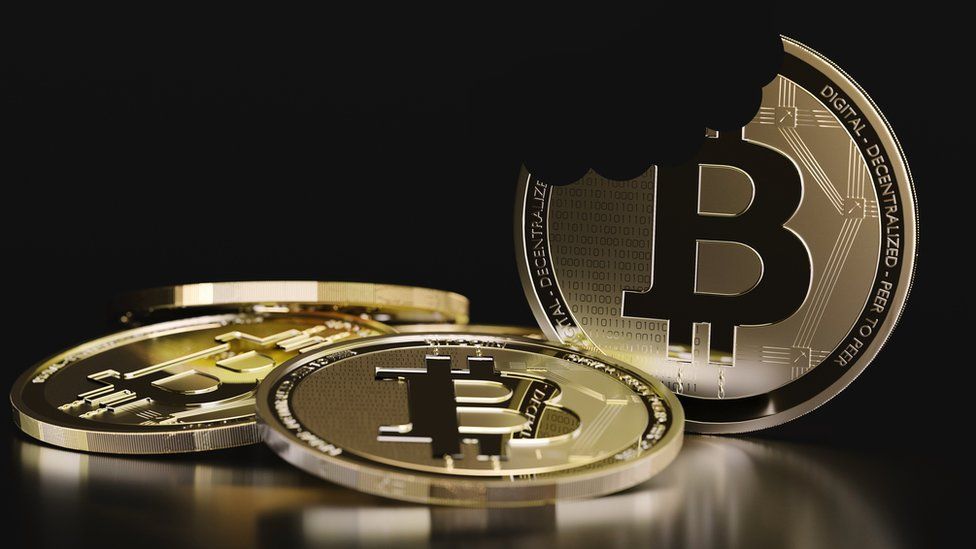 IMAGE SOURCE,GETTY IMAGES
IMAGE SOURCE,GETTY IMAGES
More wealthy corporations than ever are biting off bitcoins
By Joe Tidy & The Visual Journalism Team
The price of Bitcoin is close to its all-time high, thanks in large part to US finance giants.
Investment firms like Grayscale, BlackRock and Fidelity, are pouring billions of dollars into buying the volatile digital asset.
In the last few weeks, these powerful institutions have become so called ‘Bitcoin whales’.
Because of Bitcoin’s system there will only ever be 21 million bitcoins.
19 million have been created, but many are already accounted for and probably off the market.
So what other organisations or individuals are Bitcoin whales, and what does the shift in wealth mean for the digital currency that was originally created as a peer-to-peer internet money?
The figures below are estimates gathered from direct research and published information, but should give a good overview of how Bitcoin is distributed. Our data collection ended on the morning of 29 February.
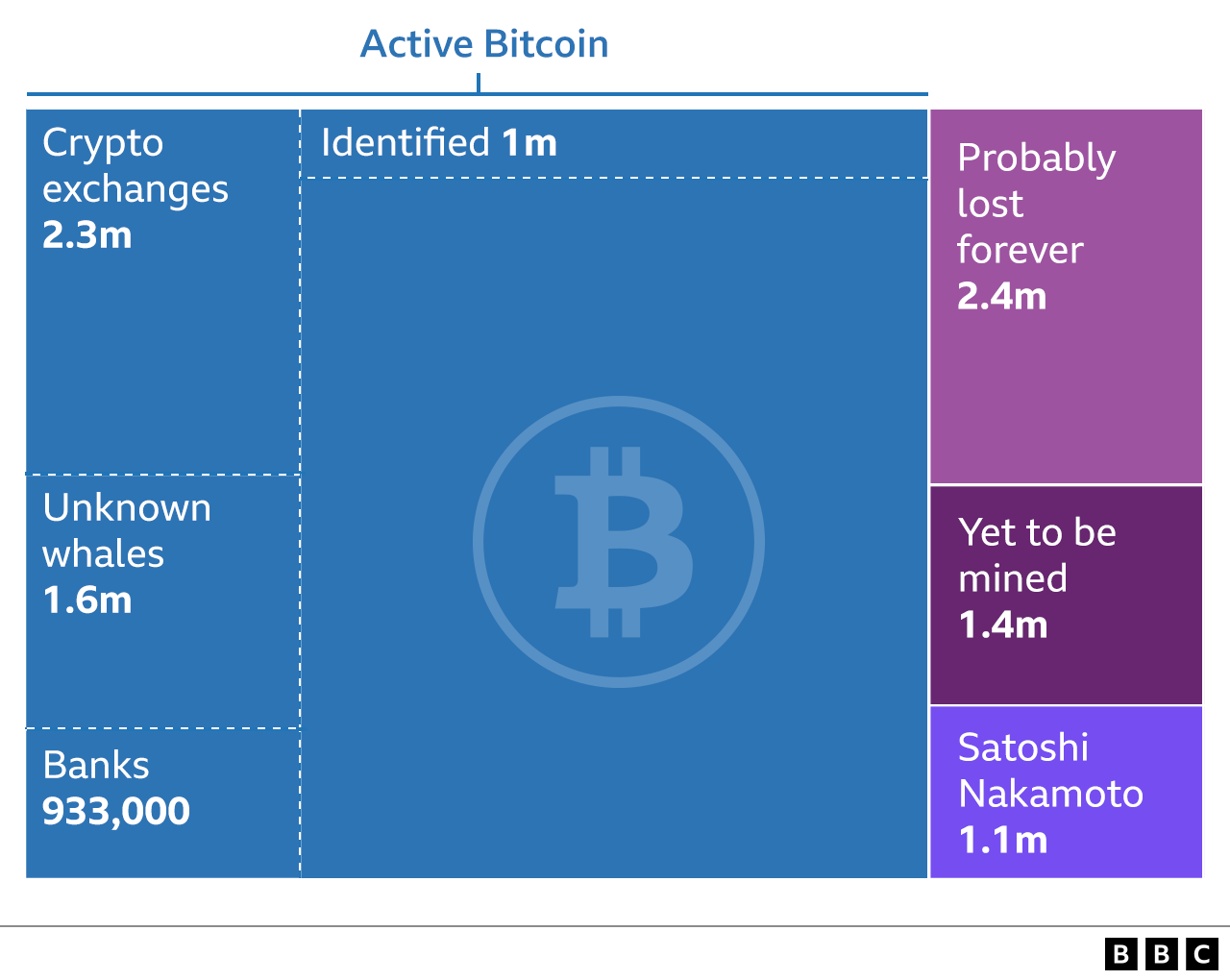
Bitcoins lost forever

Estimates for how many bitcoins are lost forever vary between three million to as many as six million. Bitcoins can be lost because people forget the details of their digital wallets - there is no ‘customer support’ in Bitcoin. Just ask James Howells, who lost 8,000 bitcoins on a discarded hard drive in Wales.
Some of these lost bitcoins might also come from abandoned criminal proceeds left untouched. According to crypto-investigators at Elliptic, 3.15 million bitcoins have been dormant for 10 years or more. Some analysts - like those from investigators Chainalysis - say Bitcoin that hasn’t been moved in five years could also be lost too. So millions more bitcoins could potentially be added to the lost pile.
A loose estimate that’s often agreed upon is 3.5 million. But 1.1 million of those dormant coins are likely to belong to the anonymous creator of Bitcoin, so we can take that portion out of the equation. A conservative estimate for lost coins therefore is about 2.4 million, or 11% of all bitcoins.
Crypto-exchanges

Cryptocurrency exchanges act like banks for crypto-users. You can exchange your traditional money like dollars or pounds for Bitcoin and other digital tokens. K33 researchers estimate that about 2.3 million bitcoins are kept by exchanges, either on behalf of customers or as float. Binance is the world’s largest exchange and is estimated to have about 550,000 bitcoins - followed by Bitfinex (403,000), Coinbase (386,000), Robinhood (146,000) and OKX (126,000). In total it is thought exchanges hold about 11% of all bitcoins.
Leaving your coins on an exchange can go wrong though, for example with the collapse of FTX which left customers without access to their coins. Some Bitcoin purists are also uneasy about how a reliance on large and increasingly regulated and legally compliant exchanges goes against the anti-establishment ethos of Bitcoin.
Unknown whales

A Bitcoin whale is someone who holds more than 10,000 bitcoins in their digital wallet. The website Bitinfocharts uses public blockchain records to keep a Bitcoin Rich List of the 100 richest wallets, and there are about 80 wallets with 10,000 coins or more, whose owners are unknown. Owning one of these wallets would make you a billionaire. Some of them might be the wallets of people or organisations which appear elsewhere in this graph but we will never know, unless a researcher makes the link or the whale outs themselves. A loose estimate is that large whales account for about 8% of all bitcoins.
Yet to be mined

The way that Bitcoin was invented means there can only ever be 21 million coins. Every coin has to be mined using a network of volunteer computers around the world. These computers - often owned by large Bitcoin mining companies - act like high-tech accountants checking and securing the record of Bitcoin transactions. In return for the work, the computers are automatically rewarded with Bitcoins.
Over time, the amount of coins given out as part of the mining reward is automatically reduced and in April it will halve again, squeezing the supply of new coins further. There are still about 7% of coins yet to be mined, and it is estimated that the last Bitcoin will be created in 2140.
Satoshi Nakamoto, Bitcoin inventor

The anonymous creator of Bitcoin holds an estimated 1.1 million bitcoins in wallets that were the first to be created in 2009. None of the coins have been moved in years, and no-one knows who Satoshi is - or even if he/ she/ they are still alive. If they are still alive - and estimates are correct - then this would make Satoshi Nakamoto roughly the 22nd richest person in the world. This stash is about 5% of all bitcoins.
Regulated investment firms

In January, US financial authorities allowed regulated investment firms to start selling new financial products linked to Bitcoin, called Spot Bitcoin ETFs. In mid-February, the investment giants that applied to start ETFs began buying bitcoins in their thousands, as everything from hedge funds to stock market traders purchased ETFs to bet on the price of Bitcoin, without having to own any coins themselves.
According to K33 Research, 933,000 coins had already been allocated or purchased by 29 February, and are currently being held by the institutions for these new financial products. K33 analysts think that the biggest holder is Grayscale, which started as a digital currency investment firm. It is estimated to have around 450,000 bitcoins. Other giants include BlackRock (150,000) and Fidelity (102,000).
Most crypto-fans online are celebrating the rise in their personal fortunes thanks to the financial establishment pumping up Bitcoin’s value through increased demand. But some have expressed concerns about a consolidation of power and wealth into the traditional regulated banking system that Bitcoin was invented to replace. These financial giants now hold about 4.5% of all coins. One wonders what Satoshi Nakamoto will think if and when the banks overtake him/ her in their bitcoin holdings.
Law enforcement

Police forces around the world regularly bust cyber-crime gangs or illicit market places, seizing huge stashes of bitcoins in the process. There have been three major seizures of Bitcoin by the US since 2020. Eventually they will be sold at auction, but according to research from 21.co the funds have remained in their respective crypto-wallets and not moved, so there are nearly 200,000 bitcoins held from the busts. Arkham Intelligence has also linked a Bitcoin wallet address containing another 30,000 coins to the US takedown of the darknet market place Silk Road. The UK is thought to hold 61,000 bitcoins from a major seizure in 2018, and it is thought German police still have 50,000 coins from a recent operation.
MicroStrategy, software company

Bitcoin believers are often depicted as having laser eyes in images on social media, and none burn brighter than those of software entrepreneur Michael Saylor. In 2020, he persuaded his enterprise software company to start buying up as much Bitcoin as they could, and he celebrates every purchase with a Tweet that invariably goes viral with crypto-fans. MicroStrategy, plus its subsidiaries, now has around 193,000 bitcoins, and is the largest single organisation owner of the digital coins.
Block One, crypto-software company

In 2020, the CEO of crypto-software makers Block One tweeted that his company has continued buying bitcoins after an initial purchase of 140,000. So the true figure is likely to be much higher. The firm did not respond to our email.
Mt Gox, coins lost in the hack

In a flurry of disastrous hacks and mishaps, the world’s first major crypto-exchange, Mt Gox, lost about 850,000 bitcoins in 2011. Mark Hunter, the author of a book about it, says there is still confusion about what happened to the coins, but it is assumed that the majority have been sold back to the open market by the thieves.
However, 80,000 bitcoins sit untouched in a now famous crypto- wallet address starting with ‘1Feex’. This stash will probably never be recovered or moved. Another 2,600 bitcoins were also accidentally and irreversibly destroyed during the chaos. Some of the customers who lost their savings in the hacks have begun to receive a portion back from recovered coins.
Winklevoss Twins, investors

It is not known for sure how many Bitcoins the crypto-entrepreneur brothers own now, but in an interview in 2017 with the New York Times the twins revealed they had around 70,000, and said they had not sold any.
Tether, crypto coin company

Tether is its own crypto token known as a stable coin, but the company behind it has been buying up bitcoins for years as part of its reserves. Industry watchers estimate the firm has around 67,000 bitcoins after a published audit in January said the company had the equivalent dollar amount of Bitcoin.
Publicly listed Bitcoin miners

Bitcoin mining companies run warehouses full of powerful computers, whirring away to keep the public blockchain of transactions up-to-date. In exchange for the work, the Bitcoin system automatically rewards them bitcoins in a process called mining. Bitcoin mining is controversial because of the environmental cost of running the computers and keeping them cool. It has become harder over time to successfully mine for Bitcoin, so large companies make up the lion’s share of the Bitcoin mining pool around the world.
Many of them are not public, but according to research from K33 the largest 8 publicly listed ones hold around 40,000 bitcoins. The largest include Marathon (16,000), Hut8 (9,000) and RIOT (7,600).
Tim Draper, investor

US venture capitalist investor Tim Draper made headlines in 2014 when he bought 30,000 bitcoins that had been seized by police from Silk Road and auctioned by the US government. At the time the coins cost him $17 million. Although he doesn’t declare how many coins he now owns, he told crypto website Protos in 2022 that he has not sold any and is still buying bitcoins, so we can assume his holding has increased significantly.
Michael Saylor

The founder of Microstrategy tweeted in October 2020 that he personally holds 17,700 bitcoins. It is likely to be more by now.
Tesla, company

Tesla’s quarterly earnings at the end of 2023 didn’t mention any changes to its finances with regard to its Bitcoin holdings. So we can assume that the company still owns just over 9,700 Bitcoins. In 2021, Elon Musk’s company had purchased more than 40,000 coins, but sold off the majority in recent years.
Block, payments and crypto-tech company

Block, the payments company led by Jack Dorsey, the founder of Twitter, has long been a crypto- backer. In its latest earnings report, it said it had approximately 8,038 Bitcoins for investment purposes.
Peter Thiel, investor

It is not known exactly how many bitcoins the billionaire investor owns, but in 2023 his company started buying bitcoins - spending $100m in total so far.
El Salvador, the country

The Bitcoin-loving president of the Central American country El Salvador started buying Bitcoin with public money as part of a controversial investment plan for his country in 2021. The number of bitcoins here is gathered from his tweets by Dutch researcher Elias, who runs a website tracking the portfolio. Public records are not kept on exactly how many coins have been purchased or at what value.
People
A ball-park figure for how many bitcoins are held by the general public is what’s left - 10.5m bitcoins. This is about 50% of all bitcoins that exist today when you take out all the above chunks that we know about. This number will be higher when you factor in the coins held by exchanges, as most of those are owned by people too. But it might also be lower if the number of lost coins is higher or the amount of coins that bitcoin whales are sitting on is more than we know.
No-one knows for sure how many individual people own bitcoins, but crypto-tech company River estimated that Bitcoin had 81.7 million users as of June 2023, or 1% of the global population.
Interestingly, research suggests that the latest surge in the value of Bitcoin is not coming because individual retail investors are buying bitcoins. Analysts at IntoTheBlock say Bitcoin whales like the big banks are pushing up price and demand - not an increase in ordinary people turning to this peer-to-peer digital cash.
Anyone who keeps their crypto on an exchange is asking for trouble.
I think there is a difference between BTC and FTX.
Nothing is guaranteed, but BTC has more assurance.
Crypto is weird kind of fun.
I put…I think…$250-$300 into it at the start of 2018. I’d first heard about it on Triple J…maybe…2013? Thought…I should try that, but Wim can’t computer, so…missed out there.
And from my initial play money investment it went down to about $38.
And I forgot about it.
Until that $38 went up to over $900.
Second time I picked the wrong time.
Anyway, it crashed again, and I forgot about it until recently and now it’s at about $500.
So weird.
All of it.
In the very early days of crypto i heard it was used heavily for drug traffiking. Large transnational anonymous payments
It wouldn’t surprise me if some of the larger holders of crypto are drug lords.
On that basis i am really surprised at how legitimised its become.
I’m just glad (in a way) that it never became significant enough for me to worry about it.
It’s just there.
At the moment it’s fun to watch.
I’ve probably posted this before because it’s such a fun (only because she’s doing quite okay) story.
Think you would be pretty surprised.
I reckon some of the larger transactors in BitCoin are probably drug lords (and other organised criminal, including sanctions-breakers in Russia, North Korea etc). Its biggest practical use case has been its (relative) anonymity which makes it great for sending money that’s hard to trace. But if you’re a drug lord and you’re getting paid in Bitcoin, you want to be able to SPEND the stuff on golden Maseratis and whatever. Bitcoin comes in, bitcoin goes out, for these guys.
The largest holders of bitcoin are a few tech people. Some who were in very big early when it was very cheap or easy to mine, and some of who started out rich from some other tech investment and put a bunch of their spare cash into bitcoin when it was still on the way up. And there’s a few professional crypto people, exchanges and stuff, who hold a lot of it too. And of course there’s god knows how many sitting forgotten on abandoned hard drives in people’s bottom desk drawers, passwords long lost, or else on hardware currently being ‘recycled’ by a 12yo orphan in Ghana who’s poisoning himself for a few cents worth of recoverable metals from someone’s old Pentium.
BTC itself is very easy to track - it’s a public ledger. Plenty of other ‘coins’ for stealth purposes.
BTC all time highs.
